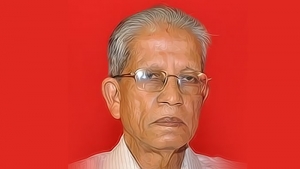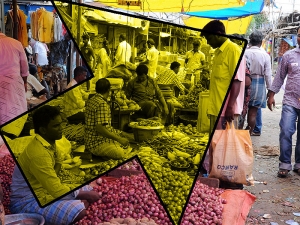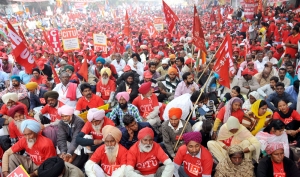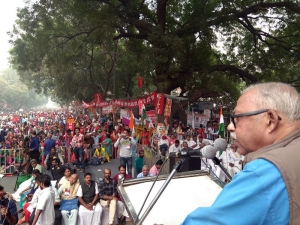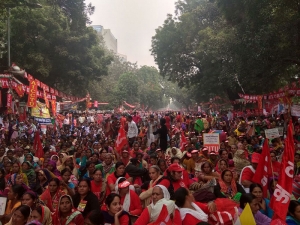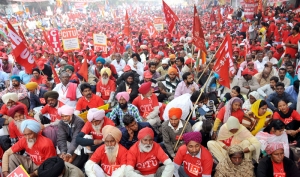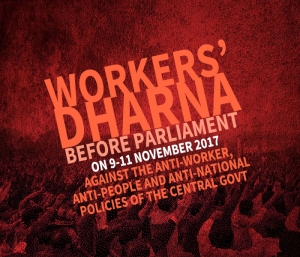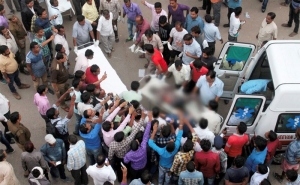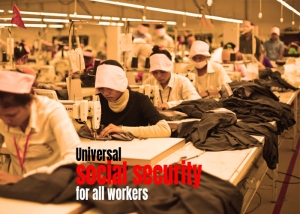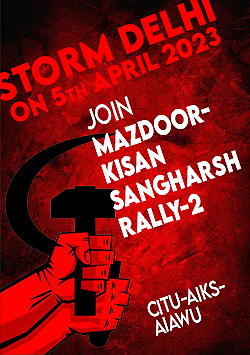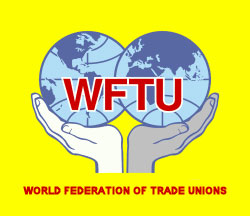Super User
COMRADE SUKOMAL SEN AMAR RAHE
The Centre of Indian Trade Unions expresses profound grief at the sudden demise of Com Sukomal Sen, a veteran as well as a stalwart in the country’s working class movement, today at 10 am after prolonged illness. He was 83.
Com Sukomal Sen is one of those veterans in the working class and employees’ movement in the country who contributed immensely both ideologically and organizationally in building broadest unity of the working people and also channelizing the movement in the track of class orientation consistently exposing the successive policy regimes under the capitalist order through its various phases. He was one of the frontline organizers of the state govt employees movement not only in West Bengal but in other states of the country and he was one of the founder leaders of the All India State Govt Employees Federation (AISGEF) since its birth in 1960 and led the Federation as its General Secretary From 1982 to 2008. He was Senior Vice Chairman of AISGEF till his demise.
Along with discharging his leading role in Govt employees’ movement, Comrade Sen was also active in organizing, leading and guiding the trade unions in other sectors as well. He had been the national working committee member of CITU for decades and was elected Vice President of CITU from its national conference at Chandigarh in 2010 and served in that position since 2016 and was elected permanent invitee to CITU national secretariat from its 15th Conference held in Puri in November 2016.
Comrade Sen had been a popular personality in international trade union movement as well. His debut in the international trade union sphere had been with his active contribution in the Directive Committee of the Trade Union International of Public and Allied Employees in 1982 at Prague. In 1996 he was elected General Secretary of TUI Public & Allied Service and played frontline role in leading and coordinating the movement and activities of Govt and public sector employees till he relinquished that position in 2009.
He also played a leading role in championing the cause of working people as Parliamentarian during his 12 years stint as a Member of Rajya Sabha during 1982 to 1994.
Besides playing a frontline role as organizer and leader of the movement of the working class in the field, he also made signal contribution intellectually in the sphere of enriching ideological content of the working class movement. He was a scholarly writer and was the author of ‘Working Class In India-History of Emergence of Movement (1830-2000)”(translated in various Indian languages), “May Day and Eight Hours Struggle in India”, “Communist Manifesto and the Theory of Revolution- a 150th Anniversary Tribute”, “The History of All India State Govt Employees Federation”, “International Working Class Movement-Dynamics of Class Struggle Vs Class Collaboration” outlining the history of World Federation of Trade Unions since its foundation congress in 1945 to World Congress 2011. He also authored books on numerous other subjects viz., on Question of Culture and Social Revolution in Indian Society, Caste Religion and Indian Society, Fascism etc and had been a regular contributor to various journals on political-ideological issues published both in India and abroad. He had been the Editor of the “Employees Forum” the Organ of the All India State Govt Employees Federation since its birth in 1979 for over three decades. And his latest contribution is the two volume book on the subject of October Revolution and its aftermath published recently.
Comrade Sukomal Sen, throughout his active life had been a Communist and displayed his commitment the ideology of revolution in all his activities in all fronts. He had been Central Committee member of the Communist Party of India (Marxist) for decades till his demise as ex-officio.
With Comrade Sukomal Sen’s demise, the country lost a stalwart leader of the Working Class movement as well as a Scholar Visionary and a great teacher. At present juncture of the working class movement facing tremendous physical as well as ideological offensives, Comrade Sen’s absence is an irreparable loss.
CITU dips its flag in respect to the memory of the departed leader and conveys heartfelt condolence to all the comrades and his bereaved family members.
Tapan Sen
On behalf of the CITU Secretariat
Countrywide Protest by Workers Against Price Rise on 13 December 2017
· Modi government’s policies and failures are responsible for Price Rise
· Countrywide Protest by Workers Against Price Rise on 13 December 2017
The Centre of Indian Trade Unions (CITU) calls upon the working people throughout the country, its units and affiliated unions of the workers to register countrywide protest against the continuing price rise on 13 December 2017, in every industrial centre, city, town and rural areas by staging demonstrations.
Modi government’s policies are entirely responsible for this price rise, inflicting huge sufferings and miseries on the workers and other sections of toiling masses. In fact, prices are not just increasing; they are being made to increase through policy drive of the Govt to benefit middlemen, big traders, black-marketeers and speculators. This is also an integral part of their policy of “ease of doing business” which is synonymous to “ease of looting the people”.
Despite fraudulent showcasing of fall of price indices occasionally by the Govt, in reality, prices of all essential commodities including food grains, vegetables, transport and health services, medicines, education etc have been consistently increasing; the targeted public distribution system has been made to virtually collapse in most of the states; various conditionalities imposed including AADHAR linkage on everything deprives larger section of poorer population from the PDS, mocking at the Food Security Act. Price of petroleum and diesel has been increasing in regular interval and LPG subsidy is being cut despite decline and/or virtual stagnation of crude oil price in international market generating cascading effect on prices of all essential commodities. On the other hand farmers are not getting the remunerative price of their produce which is way below the ruling prices of food grains and other agri-products in the market. And in the midst of such horrifying syndrome of rising prices, speculation in commodity market is going on creating big fortune for corporate traders and speculators. Demonetisation followed by GST has added further fuel to fire of price-rise. It is not without reason that under Modi’s rule, the country’s position is going up in “ease of doing business” index simultaneously pushing the country down in respect of “Hunger” index.
While continuing price rise is putting the mass of the common people in unimaginable miseries making human survival difficult and causing death due to hunger, the Govt of the day is further adding to their miseries by depriving them with proper minimum wage. All welfare expenditure including on MGNREGA is drastically cut down, as reflected in the sharp decline in work days available under MGNREGA throughout the country.
In this background, CITU calls upon the working class to intensify countrywide campaign against the grossly inhuman policy of the Modi Govt in promoting price-rise for the benefit of big-business-trader-speculator combine and launch militant demonstration as widespread as possible on 13th December 2017 and burning the effigy of the Modi-Govt.
Issued by
(Tapan Sen)
General Secretary
Intensify struggle to reverse anti national policies of Modi government! Massive ‘mahapadav’ calls upon the working class
The unprecedented joint trade union ‘mahapadav’ of workers concluded in the evening of 11th November 2017 with a clarion call to the working class of the country to intensify the struggle against the anti worker, anti people and anti national policies of the BJP led government.
The huge mass of workers who gathered from all over the country and from all sectors of the economy enthusiastically endorsed the unanimous call of the leadership of the joint trade union movement, made in the light of the 8th August 2017 national convention, to prepare for an indefinite country wide general strike if the government does not change tack and heed the voice of the working class. The trade unions decided to chalk out a prolonged course of agitations and actions towards that objective.
The string of actions will start with district level joint conventions to be completed by the first week of January 2018 followed by joint ‘Satyagraha’/ courting of arrest at the district headquarters in the last week of January. The common date for the courting of arrest in all districts in the state will be decided by the joint meeting of the state leadership of the trade unions.
Lakhs of workers storm Delhi Workers' three days "MAHAPADAV" calls for preparation of countrywide indefinite strike, will organise "JAIL BHARO" in January 2018 last week before the Central Budget
The historic three days’ ‘mahapadav’ of workers near Parliament, led by the joint trade union movement ended in the evening of 11th November by calling upon the working class of the country to intensify, heighten and broaden the joint struggle to force the reversal of the anti worker, anti people and anti national policies of the BJP led government at the centre.
Towards this direction, the ‘mahapadav’ reiterated the Declaration of the national joint convention of the trade unions held on 8th August 2017 calling upon the working class to prepare for a country wide indefinite strike if the BJP led government failed to take any positive measures on the 12 point charter of demands of the entire trade union movement.
Lakhs of workers from all over the country representing all the sectors of our economy have participated in the ‘mahapadav’ and demonstrated their anger against the policies of the BJP led government at the centre. Even after the ‘mahapadav’ was over, huge processions of hundreds of workers were reaching the Parliament Street, as the trains they were travelling in were delayed by several hours. Thousands of workers had to return back from the railway stations in their states as several trains were cancelled.
The central trade unions congratulated the working class of the country for their overwhelming and enthusiastic response to the unprecedented ‘mahapadav’. The exemplary discipline exhibited by the workers from different states and industries belonging to different organisations during the entire duration of the three days ‘mahapadav’ was highly significant. The massive participation of women workers, not only scheme workers but from different sectors, and young workers was another significant feature.
Issued by,
(TAPAN SEN)
General Secretary
TO REVERSE THE ANTI WORKER ANTI PEOPLE AND ANTI NATIONAL POLICIES - DISTRICT LEVEL SATYAGRAHA IN LAST WEEK OF JANUARY! SECTOR WISE JOINT STRIKE AGAINST PRIVATISATION!
CENTRAL TRADE UNIONS CALL UPON THE WORKING CLASS
The central trade unions heartily congratulate the working class of the country for their overwhelming and enthusiastic response to the unprecedented three day joint ‘mahapadav’ near Parliament on 9-11 November 2017. The exemplary discipline exhibited by the workers, from different states and different organisations, during the entire duration of the three days ‘mahapadav’ was highly significant and noteworthy. The massive participation of women workers including scheme workers, vendors, domestic workers, construction and home based workers as well as large number of young workers was another significant feature of the ‘mahapadav’.
Lakhs of workers from all over the country representing all the sectors of our economy have demonstrated their anger against the anti worker, anti people and anti national policies being pursued by the BJP led government at the centre. The ‘mahapadav’ has also once again displayed the determination of the working class to intensify the united struggle brushing aside the machinations of the communal divisive forces trying to disrupt their unity.
The central trade unions deplore the attitude of the BJP led government in totally ignoring the sufferings of the workers due to its policies and its stubborn insistence in going ahead with the very same disastrous policies. In such a situation the central trade unions have no other option but to intensify their struggle to reverse the anti worker anti people anti national policies of the BJP government to force their reversal.
Towards this objective, in the light of our 8th August, 2017 National Convention of workers held at Talkatora Stadium, New Delhi the central trade unions call upon the entire working class of the country to prepare for a prolonged agitation including strike. If the Government does not change its attitude, the CTUs will be forced to explore for the country wide national indefinite strike. In the meanwhile, prolonged agitations and actions will continue in the next phase of our united trade union movement. As a follow-up of this workers/employees’ 3 days padav, we take following activities in the coming months:
· Complete joint district level conventions by the first week of January 2018
· District level ‘Satyagraha’ in the last week of January; the common date for all districts to be decided by the state level joint meeting of central trade unions and industrial federations
· Sectoral/ industry level joint strike whenever the government takes measures at privatisation
· Protest actions on the day of presentation of Union Budget if it contains anti worker measures
· Central trade unions to meet soon after presentation of Union Budget to plan future course of action
INTUC AITUC HMS CITU AIUTUC
TUCC SEWA AICCTU LPF UTUC
INDEPENDENT FEDERATIONS AND ASSOCIATIONS
New Delhi – 11th November 2017
Lakhs of workers storm Delhi
The thousands of workers who stormed the national capital and assembled at Parliament Street in the national capital Delhi, to participate in the first day of the three days ‘mahapadav’ on 9th November 2017 enthusiastically endorsed the call of the speakers to intensify the struggle against the anti worker, anti people and anti national policies of the BJP led government and prepare for a countrywide indefinite general strike if the government fails to concede their demands.
Workers from all over the country representing many sector - public and private, permanent employees and contract, casual workers, state and central government employees, banks, insurance, telecom, railways, defence, and the various schemes of the government of India participated in the ‘mahapadav’ on the first day.
Ashok Singh (INTUC), Gurudas Dasgupta (AITUC), HS Sidhu (HMS), Tapan Sen (CITU), Satyawan (AIUTUC), G Devarajan (TUCC), Manali (SEWA), Rajiv Dimri (AICCTU), M Shanmugam (LPF) and Ashok Ghosh (UTUC) addressed the gathering in the first session presided over by Sanjay Singh (INTUC), Ramendra Kumar (AITUC), Raja Sridhar (HMS), Hemalata (CITU), RK Sharma (AIUTUC), Naren Chatterjee (TUCC), Sonia (SEWA), Santosh Rai (AICCTU), Subbaraman (LPF) and Shatrujit Singh (UTUC).
Leaders of the federations spoke in the second part of the first session. It was most significant that the leaders of the two major national federations of the railway employees - Shiv Gopal Mishra, general secretary of All India Railwaysmen’s Federation and Raghavaiagh, general secretary of National Federation of Indian Railwaymen - have announced that they would join the indefinite strike whenever the joint trade union platform gave the call. Leaders of several other all Industrial federations including Venkatachalam, general secretary of All India Bank Employees’ Association, Subhash Lamba, additional general secretary of All India State Government Employees’ Association and secretary of Electricity Employees’ Federation of India, KK Divakaran, general secretary of All India Road Transport Workers’ Federation, C Sreekumar, general secretary of All India Defence Employees’ Federation, Jagdeesh Sreemali, VS Dahiya, GR Shiv Shankar, Ravi Sen, Peelimuthu, Kalyan Sengupta, also joined them in endorsing the call addressed the huge gathering and announced they would join the indefinite country wide general strike whenever the joint trade union platform took the decision. Thampan Thomas (HMS), Vijay Pal Singh (AIUTUC), Anil Sharma (TUCC), Sonia (SEWA), Mahendra Parida (AICCTU), Natarajan (LPF) and Thomas Joseph (UTUC) also addressed
H Mahadevan (AITUC), Raghunath Singh (CITU) Shyamlal (AICCTU), Bashir Abud (LPF) replaced their colleagues in the presidium in the second part of the first session. The second session was presided over by Gurnam Singh (INTUC), C Singh (AITUC), SN Pathak (HMS), Anadi Sahu (CITU), Shiv Shankar (UTUC), Lataben (SEWA), Shyamal Prasad (AICCTU), Basheer Ahmed (LPF) and PG Prasanna Kumar (UTUC)
Three days Workers’ Dharna Before Parliament on 9-11 November 2017 Against the Anti-worker, Anti-people and Anti-national policies of the Central Govt
Joint Call of Central Trade Unions and Independent Federations
The Joint Platform of Central Trade Unions, comprising Central Trade Union Organisations and all major industry/establishment wise federations have decided to stage three days’ mass dharna before Parliament against the anti-worker, anti-people and anti-national policies of the Central Govt on 9-11 November 2017. The Joint Trade Union Platform represents workers and employees from all major sectors of industries and services viz., coal, steel, transport, telecom, petroleum, electricity, port & docks, engineering, construction, scheme-workers etc and employees of Central Govt and state govt, Railways, banks, insurance, defence production, etc. This ‘mahapadav’ is intended to demand the government to concede the unanimous demands which the joint trade union movement has been raising since the last over eight years. It is a step towards preparation for the next higher phase of united struggles including indefinite countrywide strike action, if the government continues to ignore the demands of the workers and proceed with its pro corporate agenda.
The anti-people and anti worker policies of Govt at the centre are inflicting horrific miseries and hardships on the crores of common people from every walk of life. Unemployment is getting aggravated with every passing day, calling the bluff on the Modi Govt’s promise of generating additional two crore employment every year. In fact employment generation has already turned negative following the increasing phenomenon of closure and shut-down of industries. Demonetisation, under the utterly false pretext of curbing black money, had further depressed wages and perpetuated closure of industries. It has shattered the entire economy, particularly the unorganised sector, the SME sector and the small traders and peasants in turn adversely impacting the lives, wages and earnings of crores of toiling people. Even after one year, the economy is yet to recover from its damaging impact. Hasty implementation of GST had further aggravated the miseries of people through fuelling price rise and jeopardising services, trade and various occupations. Despite the sharp fall in international price of crude oil, the government refuses to pass on the relief to the common people; instead, the prices of petrol, diesel and cooking gas are continuously increased resulting in cascading effect on the prices of all essential commodities.
The Govt has been arrogantly ignoring the 12 point charter of demands including minimum wage, social security and workers’ status and accompanying benefits for the scheme workers; it is going ahead with privatisation and mass scale contractorisation. The constitutional and statutory provisions for ensuring ‘same wages and benefits for same work’ are being denied to contract workers despite Supreme Court’s categorical judgment. The Govt has recklessly embarked upon privatisation of all public utility services like health, education, transport, Indian Railways, financial services electricity, water etc through multiple routes including whole sale outsourcing. It has allowed 100% FDI in almost all sensitive sectors including defence production, railways, oil, minerals, port and dock etc. It is destroying indigenous production capabilities to serve the interests of MNCs, under the dubious veil of “Make in India” slogan. The national interests are being severely compromised through such disastrous moves.
In addition, in order to promote “ease of doing business”, the Govt has embarked on arrogant pro-employer amendments of all labour laws aimed at imposing conditions of slavery on the working people. Already, the text of the Code on Wages Bill, Code on Industrial Relations Bill, Code on Social Security Bill, Factory (Amendment) Bill etc are in public domain. All these are designed to push the overwhelming majority of workers and employees out of the regulatory purview of most of the labour laws, curb workers’ right to form unions and protest/agitate including right to strike, and dismantle whatever existing meagre social security provisions.
Simultaneously, the communal forces, with the open and active patronage of the Govt and ruling polity are carrying out a dubious divisive and disruptive campaign to spread hatred among people, killing innocent people, particularly from the most downtrodden sections. The country is witnessing the conspiracy to create unprecedented disruption in the unity of the toiling people of the country. Trade unions are fighting against such disastrous designs of spreading poison of disruption in the society.
The Govt’s response to the 12 point charter of demands, in the meeting with all central Trade Unions called by the Labour Ministry on 7th November 2017, remains virtually negative on all counts reflecting their bias against the interests of the mass of the working people.
In totality, the policies of the Govt are destructive towards the interests of the workers, farmers and the common people at large and also against the national interest.
Representing the workers who generate the GDP and the wealth for the country, the true patriotic people concerned about welfare of all sections of toiling people, the Joint platform of united trade union movement is in a struggle to save the people and the country and force a reversal of the anti-people and anti-national policy regime. This determination is getting reflected in numerous struggles, agitations and strikes in various sectors of the economy, both organised and unorganised, during the intervening period. Lakhs of workers from all over the country and across the sectors are going to converge in the massive three days dharna before the Parliament on 9-11 November 2017 to pave the way for further heightened resistance struggle in the days to come to reverse and defeat the anti-people and anti-national policy regime in order to save the country and the people.
INTUC | AITUC | HMS | CITU | AIUTUC | TUCC | SEWA | AICCTU | LPF| UTUC
Central Trade Unions Express Shock and Grief over the Fatal Accident at NTPC, Uchahar
Central Trade Unions Express Shock and Grief over the Fatal Accident at NTPC, Uchahar
Demand Independent Probe and Adequate Compensation for the Victims
The joint meeting of Central Trade Unions held on 4th November 2017 at New Delhi expressed serious shock at the major accident at the Uchahar project of NTPC in Uttar Pradesh on 1st November 2017, killing 33 employees till 3rd November 2017. Hundreds of workers including contract workers have been seriously injured, many of them sustaining more than 70 per cent burns and still battling for life with grave uncertainty.
Central Trade Unions express their deep and heartfelt condolences to the families of all those killed in this serious accident.
Various reports including statements from workers indicate gross negligence of authorities resulting in the explosion of the Boiler. There are reports of snags appearing in the operation of the Boiler compelling the management to operate well below capacity immediately prior to accident. The accident also exposes serious deficit in putting in place safety measures at the workplace to prevent accidents.
The Central Trade Unions demand that high level Inquiry into the accident by independent agency to identify the reasons as well as to fix the responsibility in order to bring the erring personnel to book besides ensuring measures to prevent re-occurrence of such fatal happenings.
The Central Trade Union demand that medical treatment till complete cure of all those injured including the contract workers must be ensured by NTPC; not less than Rs 50 lakh compensation should be paid to the families of all the deceased employees; monetary compensation to those severely injured that has been declared should be enhanced multiple times; employment in permanent roll of the company should be given to a dependent of those deceased and also incapacitated owing to injury, including those among contract workers.
The Central Trade Unions also express solidarity to the entire workforce including the officials on the spot in this trying moment.
Signed by
INTUC AITUC HMS CITU AIUTUC
TUCC SEWA AICCTU LPF UTUC
Issued by
A R Sindhu
For Central Trade Unions
Letter to Minister for Labour and Employment
To
Shri. Santosh Kumar Gangwar
Hon’ble Minister for Labour and Employment
Government of India
Shram Shaki Bhawan
New Delhi 110 001
Sir
We thank you for your invitation to a meeting to discuss matters related to our demands.
However we are constrained to express our inability to attend the meeting for the following reasons:
· The notice was not sent to all the central trade unions which have been jointly raising the demands with the government since the last several years. We strongly protest the deliberate measure to exclude INTUC, part of the joint trade union movement that has been raising the demands. This is nothing but an ill intentioned move to divide the unity of the trade unions and the workers. We advise the government to desist from such divisive tactics.
· The notice for the meeting has been sent less than 48 hours from the scheduled time of the meeting making it impossible for us to attend it. (For a meeting at 04.30pm on 03.11.2017, the invitation letter No.Z-20025/75/2017-Coord dated 01.11.2017 was sent to us at 6.24pm)
· In addition to INTUC, some other central trade unions also did not receive the notice at all. AITUC has received the invitation only today (2nd November 2017) at about 11am. This shows the non serious attitude of the ministry towards the major demands of the entire working class of the country
In view of the above, we request you to call another meeting with adequate time and proper information to all the central trade unions to discuss the 12 point charter of demands jointly raised by the entire trade union movement of the country.
INTUC AITUC HMS CITU AIUTUC
TUCC SEWA AICCTU LPF UTUC
Universal social security for all workers
The trade unions are demanding universal social security for all workers.
Today a very small section of workers, mainly in the organised sector only are covered by social security benefits like provident fund, ESI, medical benefits, maternity benefit, accident compensation, gratuity, pension etc. Given the tardy enforcement mechanism, encouraged by the governments themselves, even fifty percent of the workers in the organised sector, particularly the contract workers, are also deprived of their legitimate social security benefits.
Despite contributing to over 60% of the country’s GDP, the unorganised sector workers do not get any social security benefits. Some segments of the unorganised sector workers like the beedi workers, construction workers, mine workers, cine workers etc are of course statutorily entitled to some social security benefits. But not even 30% of these workers are covered in practice because of the total absence of effective enforcement machinery for these schemes, either at the central level or in the states.
Ensuring ‘ease of doing business’ for the employers has become a priority under the neoliberal policies. For the present Modi led BJP government, this appears to be the determining factor of government policy. Enforcement of labour laws is the first casualty of such a policy. During the last one and a half decade, hardly 25% of the fund collected through cess for the construction workers’ welfare scheme was spent on providing benefits to the construction workers. The situation related to beedi workers and others is not much different.
The BJP led government’s high decibel advertisements proclaim that its Code on Social Security is going to cover the entire workforce including the rickshaw pullers and domestic workers.
But cover with what? There is no answer. No specific social security scheme is proposed.
Who will be covered exactly? Establishments will have to be registered for the workers to be covered. The threshold number of workers will be decided by the government. What will be the threshold level? This BJP government has raised the threshold level of employment under the Factories Act to 40. That means that more than 72% of factory workers who were being covered by the Factories Act will now be thrown out. Will the factories with less than 40 workers be eligible for registration under the Code on Social Security? Will the workers of these establishments be eligible for whatever benefits are provided under this Code? No answer.
What is clear is that the government is not contributing a single paisa for social security for the workers. (Except of course spending some thousands of crores of rupees on advertisements, to secure its own future and to benefit the owners of corporate media) Unorganised workers will have to contribute at the rate of 12.5% of their wages for the social security benefits. If the employers are not identifiable, the workers are categorised as self employed and they have to contribute 20% of their earnings.
15 existing social security legislations –
• Employees State Insurance Act
• Employees Provident Fund and Miscellaneous Provisions Act, the
• Employees Compensation Act
• Maternity Benefits Act
• Payment of Gratuity Act
• Unorganised Workers Social Security Act
• Building and Other Construction Workers Welfare Cess Act
• Beedi Workers Welfare Cess Act
• Beedi Workers Welfare Fund Act
• Iron Ore Mines, Manganese Ore Mines and Chrome Ore Mines Labour Welfare Cess Act
• Iron Ore Mines, Manganese Ore Mines and Chrome Ore Mines Welfare Fund Act
• Mica Mines Labour Welfare Cess Act, the
• Limestone and Dolomite Mines Labour Welfare Fund Act
• Cine Workers Welfare Cess Act and
• Cine Workers Welfare Fund Act, - are amalgamated into this Code on Social Security.
The entire fund with the existing central funds like the EPF, ESI, CMPF, Building and Other Construction Workers’ Welfare Fund etc, amounting to around Rs 12 lakh crore, along with the huge amount that will be collected from the unorganised workers and self employed, will be placed at the disposal of the National Council of Social Security, to be chaired by the Prime Minister. This will then be made available for speculation in the share market to satisfy the finance capital lobby.
Is this social protection or blatant deception?
Remember, the erstwhile UPA government had enacted the Unorganised Workers’ Social Security Act in 2009. No new social security benefit had been formulated under that Act; neither during the tenure of the UPA government nor under the present BJP led Modi government. No funds were allotted for the social security schemes under this Act; either by the then UPA government or by the present BJP government. Only some already existing social security schemes, most of them meant for BPL people were made applicable to the unorganised workers. The present government made even the National Social Security Board constituted under the Act totally non functional. Some of the old schemes were discontinued and launched with new names.
Cutting down social welfare expenditure and pampering the big corporates, big business and finance capital – is the hallmark of neoliberal policies.
CITU and other central trade unions (except the BMS, which called the Code on Social Security ‘historic and revolutionary piece of legislation!) are determined to expose this fraud on the workers.
The mass dharna near Parliament on 9-11 November 2017 is part of this effort. We appeal to the workers irrespective of affiliations to be prepared for bigger struggles till we achieve universal social security for ALL.
We shall Fight! We shall Win!
